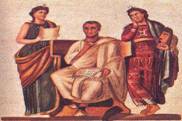
CLASSICAL STUDIES (CLA)
The Classical Studies major offers students an interdisciplinary approach to the classics. Successful completion of the CLA major fulfills the College’s Additional Depth of Understanding and leads to a B.A. degree. The program combines a linguistic focus (on Latin) with extensive training in a variety of disciplines pertaining to Greek and Roman antiquity. Students will be able to choose from courses in ancient art, classical literature, ancient history, ancient philosophy, and related fields. This major helps prepare students for graduate study of classics, ancient history, archaeology, and museum studies.
The major consists of a minor in Latin (18 hours) plus another 18 hours to be taken from three of the following pairs of courses: (a) ART 106 and 362; (b) CLA 101 and 102; (c) HIS 301 and 302; and (d) PHI 311 and 360 (when the topic is a classical philosopher). One additional course must be taken from ANT 354, CLA 153S-253S (if three credits or more), CLA 198, GRK 111 or 112, or another course from (a)-(d) above. The major includes a total of 39 hours, 21 in upper-division courses. A portfolio of three sample papers from three different disciplines from courses taken for the major must be submitted at the completion of the program.
Classical literature courses have no language prerequisites. These courses are recommended as electives or to fulfill the requirements of the Classical Studies major. CLA 101 or 102 may be used to fulfill the Western Heritage Literacy Block of General Education.
Course Descriptions
CLA 101. Epic, Lyric, and Tragedy (3 hours)
This course introduces students to three major genres of classical Greek and Roman literature. All texts are read in English translation and focus on themes such as the hero and the ancients’ view of their gods. The reading list includes some of the most prominent authors
of classical literature, such as Homer, Sappho, Pindar, Aeschylus, Sophocles, Euripides, Catullus, Horace, Vergil, Propertius, and Ovid. In reading, discussing, and writing about these texts students engage some of the most fundamental questions of human existence and consider how these works shaped Western society. In addition to close literary interpretations and discussions, the course offers an introduction to classical mythology as well as ancient history and culture, all areas of study important for the development of the West. (Every two years) Syllabus.
CLA 102. Comedy and Satire (3 hours)
This course introduces students to two genres which share a high degree of wit and humor, but which also deliver social and/or political criticism on a deeper level of meaning. All texts are read in English translation. The reading list includes authors such as Aristophanes and Menander (Greek comedy), Plautus and Terence (Roman comedy), as well as Horace, Persius, Martial, Juvenal, Petronius, and Seneca (all representatives of satire, a genre dominated by Roman writers). In reading, discussing, and writing about these texts students engage some of the most fundamental questions of human existence and consider how these works shaped Western society. By studying Greek and Roman comedy and satire students begin to understand the many ways in which their own cultural background on the one hand is shaped by Greco-Roman culture and, on the other hand, informs their understanding of foreign (in this case, classical) culture. (Every two years) Syllabus
CLA 153S-253S. Classical Studies Abroad (Variable credit; up to 12 hours)
Prerequisites: none for CLA 153S, consent of the instructor for CLA 253S. Study abroad with emphasis on one or more of the following areas: Roman and Ancient Greek literature, history, archaeology, art, architecture, language, philosophy, religion, everyday life, and other areas of classical culture. May be taken more than once. (Occasionally) Syllabus.
CLA 198. Special Introductory Topics in
Classical Studies (Subtitle) (3 hours)
Study of an introductory topic in Classical Studies not covered in any of the departmental offerings. This course may be applied to the Classical Studies major. (Occasionally)
